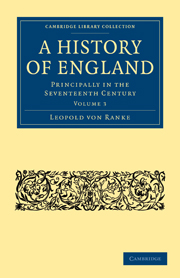Book contents
- Frontmatter
- Contents
- BOOK XI THE COMMONWEALTH IN ENGLAND, 1649—1653
- BOOK XII THE PROTECTORATE OF OLIVER CROMWELL, 1653–1658
- BOOK XIII FALL OF THE PROTECTORATE AND THE COMMONWEALTH. RESTORATION OF THE MONARCHY, 1658—1660
- INTRODUCTION
- CHAP. I Attempt to continue the Protectorate
- CHAP. II Attempt to form a Commonwealth on a new basis
- CHAP. III Royalist movements in the summer of 1659
- CHAP. IV Supremacy and constitutional projects of the Army
- CHAP. V Lambert and Monk. Restoration of the Rump Parliament
- CHAP. VI Anti-republican movement. Monk in the City
- CHAP. VII Recall of the King
- BOOK XIV THE FIRST FIVE YEARS UNDER CHARLES II. THE RESTORATION OF THE ANGLICAN CHURCH
- BOOK XV THE DUTCH WARS OF CHARLES II. ESTABLISHMENT OF THE PROTESTANT AND PARLIAMENTARY CHARACTER OF THE CONSTITUTION 1664—1674
CHAP. VII - Recall of the King
Published online by Cambridge University Press: 07 June 2011
- Frontmatter
- Contents
- BOOK XI THE COMMONWEALTH IN ENGLAND, 1649—1653
- BOOK XII THE PROTECTORATE OF OLIVER CROMWELL, 1653–1658
- BOOK XIII FALL OF THE PROTECTORATE AND THE COMMONWEALTH. RESTORATION OF THE MONARCHY, 1658—1660
- INTRODUCTION
- CHAP. I Attempt to continue the Protectorate
- CHAP. II Attempt to form a Commonwealth on a new basis
- CHAP. III Royalist movements in the summer of 1659
- CHAP. IV Supremacy and constitutional projects of the Army
- CHAP. V Lambert and Monk. Restoration of the Rump Parliament
- CHAP. VI Anti-republican movement. Monk in the City
- CHAP. VII Recall of the King
- BOOK XIV THE FIRST FIVE YEARS UNDER CHARLES II. THE RESTORATION OF THE ANGLICAN CHURCH
- BOOK XV THE DUTCH WARS OF CHARLES II. ESTABLISHMENT OF THE PROTESTANT AND PARLIAMENTARY CHARACTER OF THE CONSTITUTION 1664—1674
Summary
As yet no understanding existed between General Monk and the royal court. We possess in full the correspondence between Hyde and the Secretary Nicholas, and not merely is there no mention anywhere made of such an understanding, but the letters express mistrust and the liveliest anxiety. At the time of Monk's advance into England the Secretary observes that it was clear he had some great object in view, but whether it were favourable or not to the King no one knew. This the event might perhaps show. As Monk approached the capital, the Royalist leaders seriously considered the advisability of combining with the fanatics, who might perhaps be induced, in the confusion of a riot, to call for a King and a free Parliament.
Advances had been made to Monk at the instance of the King, who invariably endeavoured to gain over those of his old opponents who became powerful, even for example Henry Cromwell and Lambert. Monk's reply was characteristic. He did not reject the proposal absolutely, but the attitude which he assumed after his entry into London was far from satisfactory to the court at Brussels. In answer to a correspondent who had written confidently, the Chancellor tells him that he deceives himself, or perhaps is intentionally deceived. Those who were further from the scene of action came to the same conclusion.
- Type
- Chapter
- Information
- A History of EnglandPrincipally in the Seventeenth Century, pp. 288 - 308Publisher: Cambridge University PressPrint publication year: 2010First published in: 1875

